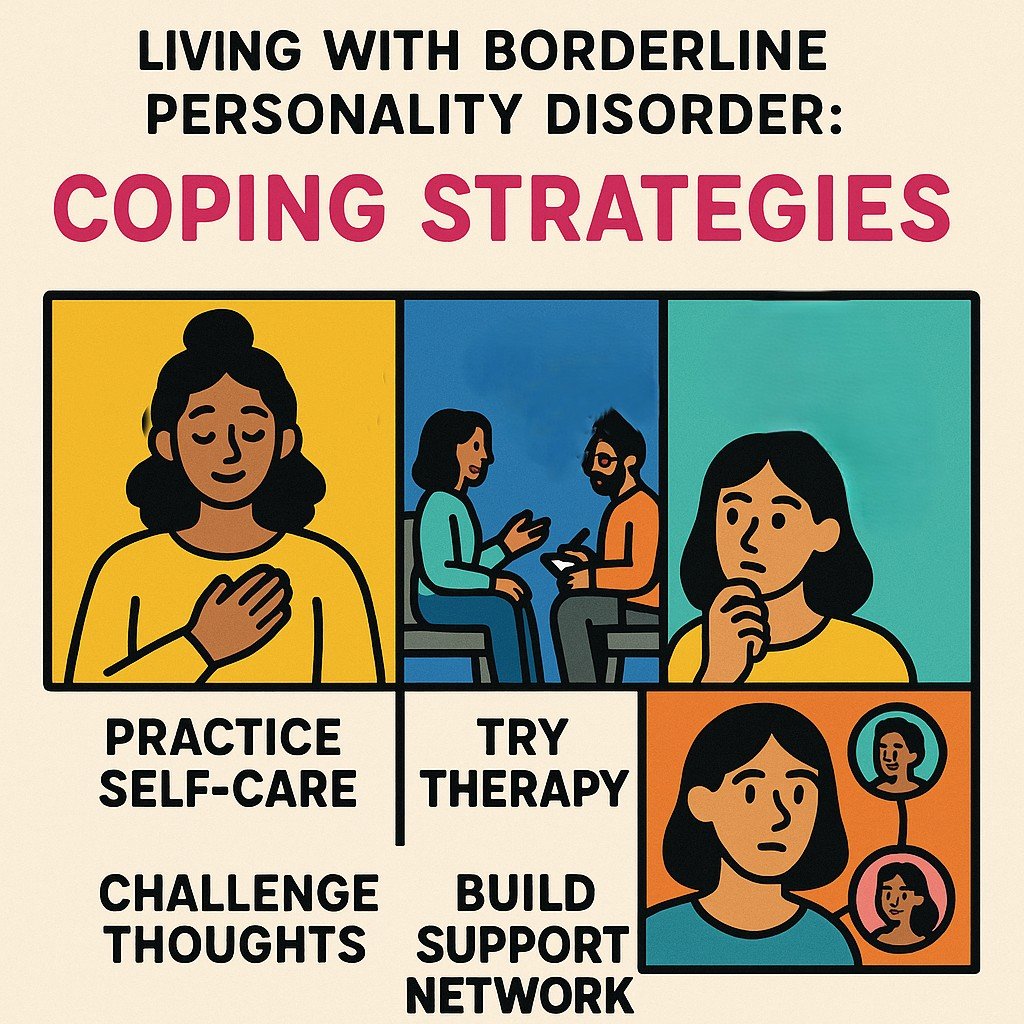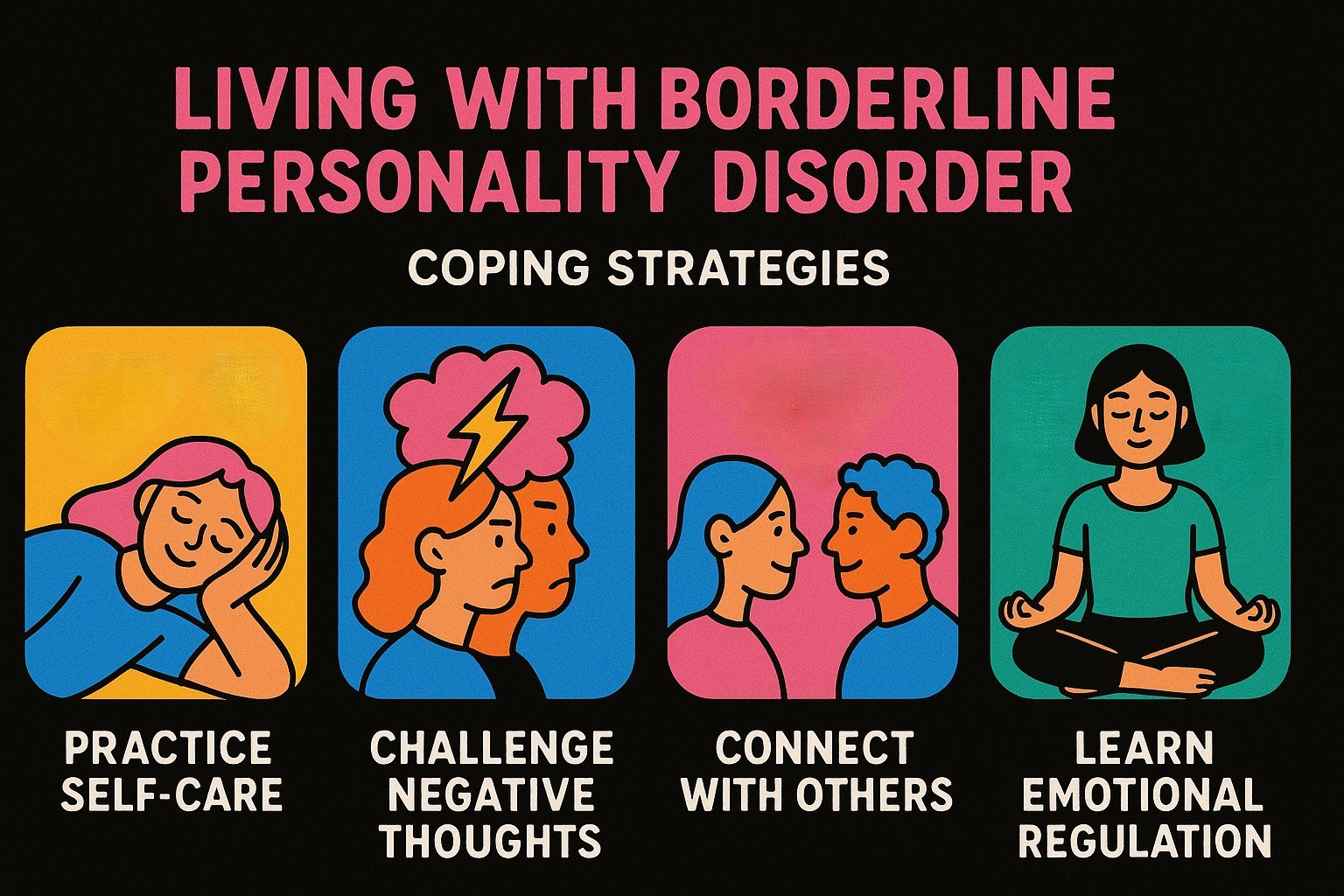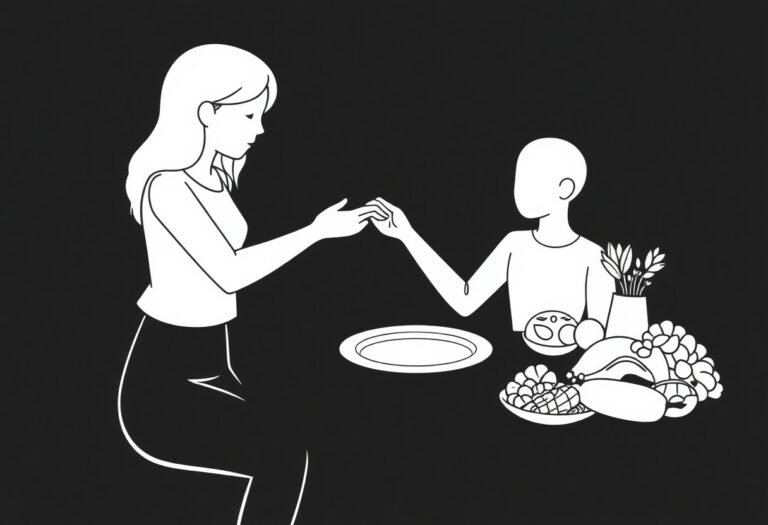Living with Borderline Personality Disorder – Coping Strategies
Many individuals grappling with Borderline Personality Disorder (BPD) face unique challenges that can impact their daily lives. Understanding effective coping strategies while living with Borderline Personality Disorder is important for managing intense emotions, maintaining stable relationships, and fostering a sense of well-being. In this post, you will discover practical techniques to help navigate the complexities of your experiences, ultimately leading to a more balanced and fulfilling life. By integrating these strategies, you can not only enhance your emotional resilience but also foster meaningful connections with others.
Key Takeaways:
- Establishing a strong support system is imperative; connect with friends, family, or support groups to share experiences and feelings.
- Practising mindfulness and grounding techniques can help manage intense emotions and reduce impulsive behaviours.
- Engaging in regular therapy, such as Dialectical Behaviour Therapy (DBT), can provide valuable tools for coping and improving emotional regulation.
- Healthy lifestyle choices, including balanced nutrition, regular exercise, and sufficient sleep, can have a positive impact on mental health.
- Developing self-compassion and establishing personal boundaries are important for maintaining emotional well-being and self-esteem.
Understanding Borderline Personality Disorder
Your journey to understanding Borderline Personality Disorder (BPD) begins with recognising that it is a mental health condition characterised by pervasive instability in moods, self-image, and interpersonal relationships. Individuals with BPD often experience intense emotions and may struggle with feelings of emptiness, fear of abandonment, and difficulty in managing anger. Understanding these core aspects can help you gain insights into your own behaviours and emotional responses, ultimately paving the way towards healthier coping strategies.
Symptoms and Diagnosis
At the heart of diagnosing Borderline Personality Disorder are its common symptoms, which include turbulent relationships, extreme emotional reactions, and impulsive behaviours. Mental health professionals rely on the Diagnostic and Statistical Manual of Mental Disorders (DSM-5) criteria, which outline the specific symptoms necessary for a formal diagnosis. If you identify with several of these traits, seeking professional help can provide you with clarity and potential pathways to improve your emotional well-being.
Causes and Risk Factors
Besides environmental influences, several inherent causes and risk factors contribute to the development of Borderline Personality Disorder. These include genetic predisposition, childhood trauma, and neurobiological factors that affect emotional regulation. Other potential influences are:
Living with Borderline Personality Disorder: A Journey
Living with Borderline Personality Disorder requires understanding and support. It is essential to recognise how this disorder affects individuals and their relationships, as well as the importance of seeking help and implementing effective strategies.
- Family history of BPD or other mental health disorders
- Early experiences of abuse or neglect
- Chronic instability in relationships during formative years
Thou must recognise that these elements could play a significant role in shaping your experiences.
Consequently, understanding the causes and risk factors of Borderline Personality Disorder can empower you to take proactive steps in managing your mental health. Stressful life events and severe emotional abuse during childhood are deeply associated with BPD, which can heighten one’s vulnerability. By acknowledging these influences, you can work towards healing and resilience. It is vital to seek support if you believe these factors resonate with your situation, as they may have lasting effects on your emotional landscape.
- Impact of trauma on emotional development
- Genetic links to emotional dysregulation
- Social environment and relationships
You can navigate these challenges with the proper support and understanding.
Coping Strategies for Daily Life
If you live with Borderline Personality Disorder, developing effective coping strategies can significantly improve your daily life. Establishing a routine, practising self-care, and seeking support from friends or professionals can help you manage the challenges you face. Focus on recognising your triggers and implementing strategies to cope with intense emotions, creating a more balanced and fulfilling life.
Mindfulness and Grounding Techniques
Above all, mindfulness and grounding techniques are necessary tools for managing overwhelming emotions. Engaging in activities like deep breathing, meditation, or using sensory objects can help you regain a sense of control when emotions surge. By practising these techniques regularly, you can cultivate a greater awareness of your feelings and better navigate the ups and downs of daily life.
Emotional Regulation Skills
To effectively manage the intense emotions that come with Borderline Personality Disorder, developing emotional regulation skills is key. These skills enable you to better understand and control your emotional responses, reducing the potential for impulsive behaviours.
Considering your emotional states is vital for improving your well-being. Skills such as identifying triggers, labelling feelings, and utilising positive coping strategies can help you respond more calmly to distressing situations. By practising techniques like the “TIPP” (temperature, intense exercise, paced breathing, and paired muscle relaxation) method, you can manage emotional intensity, leading to enhanced emotional stability and healthier relationships.
Building Healthy Relationships
Keep in mind that building healthy relationships requires both effort and understanding. You may experience intense emotions and fluctuations, making it imperative to cultivate connections that offer support and stability. Focus on creating bonds that are based on mutual respect, open communication, and empathy. Engage with individuals who are willing to learn about your experiences and provide a safe environment for sharing feelings and concerns.
Communication Strategies
With effective communication, you can foster healthier connections. Be honest about your thoughts and feelings while practising active listening. Use “I” statements to express your emotions without assigning blame. For instance, saying, “I feel overwhelmed when…” allows others to understand your perspective, promoting empathy and understanding.
Setting Boundaries
Relationships may often blur lines, so it’s imperative to establish clear boundaries for your well-being. You should communicate your limits to ensure you maintain your emotional health while nurturing connections. This helps to prevent feelings of overwhelm and resentment.
Indeed, setting boundaries is a powerful strategy in maintaining your emotional balance. Think of it as a way to protect your mental wellbeing by ensuring that your needs are respected. You should actively communicate what you consider acceptable behaviour and what might trigger negative feelings. Additionally, be prepared to uphold these boundaries, even when faced with resistance. A strong sense of self-worth will empower you to advocate for yourself, leading to healthier and more fulfilling relationships.

Therapy and Professional Support
After seeking help for Borderline Personality Disorder (BPD), engaging in therapy and professional support is crucial to manage symptoms effectively. Various therapeutic approaches can provide you with valuable tools and insight, which can significantly improve your quality of life. Regular sessions with a mental health professional can also offer a safe space to explore your thoughts and emotions, enabling you to develop healthier coping mechanisms.
Types of Therapy for BPD
After exploring the types of therapy available, you may find the following options beneficial:
| Dialectical Behaviour Therapy (DBT) | Focuses on emotional regulation and interpersonal skills. |
| Cognitive Behavioural Therapy (CBT) | Aims to change negative thought patterns. |
| Schema Therapy | Addresses deeply ingrained patterns and beliefs. |
| Mentalisation-Based Treatment (MBT) | Enhances your ability to understand your own and others’ minds. |
| Transference-Focused Therapy (TFT) | Utilises the therapist-client relationship to explore emotions. |
Before beginning your search for a therapist, it’s important to consider what type of therapy resonates with you the most. Look for professionals who have experience in treating BPD, as their understanding of the disorder can make a significant difference in your treatment. You deserve a therapist who is empathetic and supportive, enabling you to feel comfortable and open during sessions.
Finding the Right Therapist
In fact, finding the right therapist can significantly impact your journey towards managing BPD. Start by researching local mental health services, and consider asking for recommendations from trusted sources. It’s beneficial to schedule initial consultations with potential therapists to assess their approach and compatibility with your needs. Look for those who specialise in BPD and possess strong communication skills. Feeling comfortable and understood by your therapist is paramount to building a productive therapeutic relationship, which can greatly enhance your overall progress. After identifying the right professional for you, your healing process can begin more effectively.
Self-Care and Lifestyle Adjustments
All individuals living with Borderline Personality Disorder must prioritise self-care and make necessary lifestyle adjustments. This involves taking an active role in managing your mental health, cultivating positive habits, and recognising the importance of looking after both your emotional and physical wellbeing. Creating a supportive environment for yourself can greatly enhance your quality of life.
Importance of Routine
After establishing a consistent daily routine, you may find that it offers a sense of stability and control amidst emotional turbulence. A predictable schedule can help mitigate feelings of anxiety and overwhelming emotions, providing you with a framework to navigate daily challenges. Incorporating time for self-reflection and relaxation in your routine can further support your mental health.
Nutrition and Physical Activity
About nourishing your body and staying active can significantly impact your mood and overall wellbeing. A balanced diet rich in imperative nutrients can enhance your energy levels and improve emotional stability, while regular physical activity helps to release endorphins, boosting your mood and reducing anxiety levels. Prioritising these elements can lead you to a healthier lifestyle.
Lifestyle changes involving nutrition and physical activity are vital for managing Borderline Personality Disorder. By maintaining a healthy diet, you can positively influence your brain chemistry, contributing to improved emotional regulation. Engage in activities like walking, yoga, or any other form of exercise that resonates with you, as these not only promote physical health but also serve as a powerful tool for stress relief and self-discovery. Prioritising these aspects can lead to a more balanced lifestyle and enhance your coping strategies.
Resources and Support Networks
Once again, having access to appropriate resources and support networks is vital for managing Borderline Personality Disorder (BPD). You should seek out professional guidance, reliable information, and community backing to navigate your journey. Establishing connections with those who understand your experiences can greatly enhance your coping strategies and overall well-being.
Support Groups and Online Communities
One effective way to feel supported is by joining support groups or engaging in online communities. These platforms offer a space to share your experiences and feelings with individuals who truly understand what you are going through. They can provide you with a sense of belonging and the opportunity to learn from others’ coping strategies.
Recommended Reading
At times, educating yourself can empower you to better manage BPD. You may find great value in reading books that provide insights into your condition and coping mechanisms. Various authors offer perspectives that resonate with your experience and might even lead to significant personal growth.
Groups often compile lists of highly recommended books focused on BPD, which cover a range of topics from emotional regulation to personal narratives. These resources can be a source of strength and understanding. By immersing yourself in insightful literature, you can discover effective techniques for managing your emotions, as well as find comfort in knowing you’re not alone in your struggles. Exploring these texts will not only enhance your understanding but may also encourage more positive outcomes in your life.
Conclusion
On the whole, living with Borderline Personality Disorder can be challenging, but employing effective coping strategies can significantly enhance your quality of life. By developing a toolkit of techniques that include mindfulness, emotional regulation, and supportive relationships, you can navigate the complexities of your emotions. It’s imperative to recognise your triggers and establish healthy routines that provide structure. Seeking professional help is also beneficial, as therapy can offer tailored guidance. Embrace your journey towards self-understanding and growth, and give yourself the space to heal and thrive.
FAQ
Q: What are some effective coping strategies for managing emotions in someone with Borderline Personality Disorder (BPD)?
A: Individuals with BPD often experience intense emotions. One effective strategy is the use of Dialectical Behaviour Therapy (DBT) techniques, such as mindfulness and emotion regulation skills. Practising mindfulness can help ground you in the present moment, while emotion regulation strategies, such as identifying and labelling emotions, can provide insight and facilitate healthier responses. Journaling can also be beneficial, as it allows for the expression and processing of emotions in a safe manner.
Q: How can I improve my relationships while living with BPD?
A: Building and maintaining relationships can be challenging with BPD, but open communication is key. Expressing your feelings and needs honestly to loved ones can foster understanding. Establishing and respecting personal boundaries is equally important. Additionally, seeking support from a therapist can enhance your interpersonal effectiveness skills, which can lead to healthier and more stable relationships.
Q: Are there any self-care practices that are particularly helpful for those coping with BPD?
A: Consistent self-care is vital. This may include physical activities like yoga or walking, which can help regulate mood and reduce anxiety. Creating a daily routine can provide stability while ensuring adequate sleep and nutrition support, overall mental health. Creative outlets such as art or music can serve as effective emotional releases, allowing individuals to explore and express their feelings in a constructive way.
Q: How can I deal with sudden feelings of anger or frustration related to BPD?
A: When faced with sudden feelings of anger or frustration, employing grounding techniques can be very helpful. Deep breathing exercises or the use of the 5-4-3-2-1 technique, which involves identifying five things you see, four things you can touch, three things you hear, two things you smell, and one thing you can taste, can help to shift focus and reduce intensity. It may also be helpful to remove yourself from the triggering situation and engage in an activity that you find calming, such as listening to music or going for a walk.
Q: What role does therapy play in managing BPD and developing coping strategies?
A: Therapy plays a fundamental role in managing BPD, especially therapies like DBT that are designed to address the specific challenges of the disorder. A therapist can help you develop tailored coping strategies that suit your individual needs and preferences. Additionally, therapy provides a supportive environment for exploring patterns of thought and behaviour and learning new skills to cope with overwhelming emotions. The therapeutic alliance can also serve as a significant source of empathy and validation.







